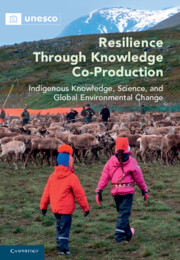
-
Select format
-
- Publisher:
- Cambridge University Press
- Publication date:
- 02 June 2022
- 30 June 2022
- ISBN:
- 9781108974349
- 9781108838306
- Dimensions:
- (244 x 170 mm)
- Weight & Pages:
- 0.77kg, 412 Pages
- Dimensions:
- Weight & Pages:
You may already have access via personal or institutional login
Book description
Confronted with the complex environmental crises of the Anthropocene, scientists have moved towards an interdisciplinary approach to address challenges that are both social and ecological. Several arenas are now calling for co-production of new transdisciplinary knowledge by combining Indigenous knowledge and science. This book revisits epistemological debates on the notion of co-production and assesses the relevant methods, principles and values that enable communities to co-produce. It explores the factors that determine how indigenous-scientific knowledge can be rooted in equity, mutual respect and shared benefits. Resilience through Knowledge Co-Production includes several collective papers co-authored by Indigenous experts and scientists, with case studies involving Indigenous communities from the Arctic, Pacific islands, the Amazon, the Sahel and high altitude areas. Offering guidance to indigenous peoples, scientists, decision-makers and NGOs, this book moves towards a decolonised co-production of knowledge that unites indigenous knowledge and science to address global environmental crises.
Reviews
‘… Krupnik’s epilogue of the book provides an excellent sum-mary of the ideas discussed and lays out how DKC may develop fur-ther in the future.’
Geoffrey Hodges Source: Indigenous Religious Traditions
Contents
Metrics
Altmetric attention score
Full text views
Full text views help Loading metrics...
Loading metrics...
* Views captured on Cambridge Core between #date#. This data will be updated every 24 hours.
Usage data cannot currently be displayed.
Accessibility standard: Unknown
Why this information is here
This section outlines the accessibility features of this content - including support for screen readers, full keyboard navigation and high-contrast display options. This may not be relevant for you.
Accessibility Information
Accessibility compliance for the PDF of this book is currently unknown and may be updated in the future.


